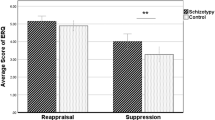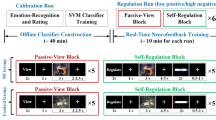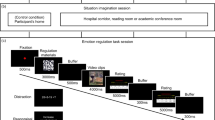Abstract
Emotional regulation, a key mechanism for promoting emotional health, has been found to play an important mediating role between psychological suzhi and emotional health, and there is a close relationship between psychological suzhi and emotion regulation effects. However, most studies on the relationship between psychological suzhi and emotion regulation effects have focused only on subjective experiences and changes in peripheral nervous system indicators, failing to examine central neurophysiological indicators of emotion regulation effects. The close relationship between psychological suzhi and emotion regulation has not yet been sufficiently revealed, and this has, to some extent, limited the in-depth exploration of the mechanisms of psychological suzhi. Therefore, to examine the relationship between psychological suzhi and changes in the nervous system surrounding emotion regulation, we aimed to deepen the research on the relationship between psychological suzhi and emotion regulation and thus to further reveal the mechanism of the role of psychological suzhi. This study used event-related potential (ERP) technology with a high temporal resolution to examine the electrophysiological differences in the use of two emotion regulation strategies, cognitive reappraisal and expressive inhibition, for negative emotion regulation among college students. The results showed that the late positive potential (LPP) amplitude of the high psychological suzhi group was significantly decreased beginning in the early time window (500–1000 ms), while the LPP amplitude of the low psychological suzhi group was significantly decreased beginning in the middle time window (1000–1500 ms). In the early, middle and late time windows, the negative emotion regulation effect of cognitive reappraisal in the group with high psychological suzhi was significantly better than that of the group with low psychological suzhi. The regulatory effect of cognitive reappraisal of negative emotion was significantly greater in college students with high psychological suzhi than in college students with low psychological suzhi.This study has enlightening significance for further research on the mechanism of psychological suzhi.



Similar content being viewed by others
Data availability
The dataset analysed for the present study and the photographs used in the photograph rating are available from the corresponding author on reasonable request.
References
Adamczyk, A. K., Wyczesany, M., Roelofs, K., & van Peer, J. M. (2023). Reappraisal is less effective than distraction in downregulation of neural responses to physical threats—An event-related potential investigation. Psychophysiology, e14316.
Bai, L., Ma, H., & Huang, Y. X. (2005). The development of native Chinese affective picture system–a pretest in 46 college students. Chin Ment Health J, 19, 4–7.
Chen, L., Oei, T. P., & Zhou, R. (2023). The cognitive control mechanism of improving emotion regulation: A high-definition tDCS and ERP study. Journal of Affective Disorders, 332, 19–28.
Cohen, N., & Mor, N. (2018). Enhancing reappraisal by linking cognitive control and emotion. Clinical Psychological Science. 6(1), 155–163.
Desatnik, A., Bel-Bahar, T., Nolte, T., Crowley, M., Fonagy, P., & Fearon, P. (2017). Emotion regulation in adolescents: An ERP study. Biological Psychology, 129, 52–61.
Dong, Z., & Zhang, D. (2015). The relationship between psychological suzhi, emotion regulation strategies and life satisfaction among middle school student. J Southwest Univ (Soc Sci Ed), 41, 99–103.
Farkas, A. H., & Sabatinelli, D. (2023). Emotional perception: Divergence of early and late event-related potential modulation. Journal of Cognitive Neuroscience, 35(6), 941–956.
Faul, F., Erdfelder, E., Lang, A. G., & Buchner, A. (2007). G*Power 3: A flexible statistical power analysis program for the social, behavioral, and biomedical sciences. Behavior Research Methods, 39(2), 175–191.
Foti, D., & Hajcak, G. (2008). Deconstructing reappraisal: Descriptions preceding arousing pictures modulate the subsequent neural response. Journal of Cognitive Neuroscience, 20, 977–988.
Fu, X., & Zhang, K. (2023). The Blue Book of Mental Health: China’s National Mental Health Development Report (2021–2022). Social Sciences Academic.
Furlong, M. J., Gilman, R., & Huebner, E. S. (Eds.). (2014). Handbook of positive psychology in schools (2nd ed.). Taylor & Francis.
Gan, S., Chen, S., & Shen, X. (2019). The emotion regulation effect of cognitive control is related to depressive state through the mediation of rumination: An ERP study. PLoS One, 14, e0225285.
Goldin, P. R., Moodie, C. A., & Gross, J. J. (2019). Acceptance versus reappraisal: Behavioral, autonomic, and neural effects. Cognitive, Affective & Behavioral Neuroscience, 19, 927–944.
Gross, J. J., Richards, J. M., & John, O. P. (2006). Emotion regulation in Everyday Life. American Psychological Association.
Gyurak, A., Goodkind, M. S., Kramer, J. H., Miller, B. L., & Levenson, R. W. (2012). Executive functions and the down-regulation and up-regulation of emotion. Cognition & Emotion, 26(1), 103–118.
Hao, P., & Pan, Y. G. (2020). Psychological suzhi and mental health of middle school students: The mediating role of emotion regulation strategies. Educational Science Forum, 28, 77–80.
John, O. P., & Gross, J. J. (2004). Healthy and unhealthy emotion regulation: Personality processes, individual differences, and life span development. Journal of Personality, 72, 1301–1333.
Kennedy, H., & Montreuil, T. C. (2021). The late positive potential as a reliable neural marker of cognitive reappraisal in children and youth: A brief review of the research literature. Frontiers in Psychology, 11, 608522.
Lang, P. J., Bradley, M. M., & Cuthbert, B. N. (1997). International affective picture system (IAPS): Technical manual and affective ratings. NIMH Cent Study Emot Atten, 1, 39–58.
Langeslag, S. J. E., & Surti, K. (2017). The effect of arousal on regulation of negative emotions using cognitive reappraisal: An ERP study. International Journal of Psychophysiology, 118, 18–26.
Langley, E. B., O’Leary, D. J., Gross, J. J., & Shiota, M. N. (2023). Breaking the Link between negative emotion and unhealthy eating: The role of emotion regulation (pp. 1–9). Affective Science.
Liu, K., Song, X., Li, H., Jiang, J., Tu, J., Tuo, T., et al. (2012). Characteristics of antecedent focused regulation and response focused regulation in military persons with different levels of mental quality during fear emotion processes. J Third Mil Med Univ, 34, 244–249.
MacNamara, A., Joyner, K., & Klawohn, J. (2022). Event-related potential studies of emotion regulation: A review of recent progress and future directions. International Journal of Psychophysiology, 176, 73–88.
McRae, K., Ochsner, K. N., Mauss, I. B., Gabrieli, J. J. D., & Gross, J. J. (2008). Gender differences in emotion regulation: An fMRI study of cognitive reappraisal. Group Process Intergroup Relat, 11, 143–162.
Moodie, C. A., Suri, G., Goerlitz, D. S., Mateen, M. A., Sheppes, G., McRae, K., & Gross, J. J. (2020). The neural bases of cognitive emotion regulation: The roles of strategy and intensity. Cognitive Affective & Behavioral Neuroscience, 20, 387–407.
Morawetz, C., Alexandrowicz, R. W., & Heekeren, H. R. (2017). Successful emotion regulation is predicted by amygdala activity and aspects of personality: A latent variable approach. Emotion, 17, 421–441.
Moser, J. S., Hajcak, G., Bukay, E., & Simons, R. F. (2006). Intentional modulation of emotional responding to unpleasant pictures: An ERP study. Psychophysiology, 43(3), 292–296.
Nittel, C. M., Lincoln, T. M., Lamster, F., Leube, D., Rief, W., Kircher, T., et al. (2018). Expressive suppression is associated with state paranoia in psychosis: An experience sampling study on the association between adaptive and maladaptive emotion regulation strategies and paranoia. British Journal of Clinical Psychology, 57, 291–312.
Ochsner, K. N., Bunge, S. A., Gross, J. J., & Gabrieli, J. D. (2002). Rethinking feelings: An FMRI study of the cognitive regulation of emotion. Journal of Cognitive Neuroscience, 14, 1215–1229.
Pan, Z., & Li, B. (2019). Differences in the effectiveness of negative emotion regulation among college students: The role of psychological suzhi and gender. J Southwest Univ (Soc Sci Ed), 45, 113–119.
Peng, X., Bao, W., Zhong, Y., & Zhu, D. (2018). The influence of children’s psychological suzhi on loneliness: The continuous mediating role of emotion regulation and peer relationship. J Southwest Univ (Nat Sci Ed), 40, 53–57.
Phillips, M. L., Ladouceur, C. D., & Drevets, W. C. (2008). A neural model of voluntary and automatic emotion regulation: Implications for understanding the pathophysiology and neurodevelopment of bipolar disorder. Molecular Psychiatry, 13(9), 833–845.
Pruessner, L., Barnow, S., Holt, D. V., Joormann, J., & Schulze, K. (2020). A cognitive control framework for understanding emotion regulation flexibility. Emotion, 20(1), 21.
Schunk, F., Trommsdorff, G., & König-Teshnizi, D. (2022). Regulation of positive and negative emotions across cultures: Does culture moderate associations between emotion regulation and mental health? Cognition and Emotion, 36(2), 352–363.
Schupp, H. T., Junghöfer, M., Weike, A. I., & Hamm, A. O. (2004). The selective processing of briefly presented affective pictures: An ERP analysis. Psychophysiology, 41(3), 441–449.
Silvers, J. A., McRae, K., Gabrieli, J. D., Gross, J. J., Remy, K. A., & Ochsner, K. N. (2012). Age-related differences in emotional reactivity, regulation, and rejection sensitivity in adolescence. Emotion, 12(6), 1235–1247.
Speed, B. C., Levinson, A. R., Gross, J. J., Kiosses, D. N., & Hajcak, G. (2020). Emotion regulation to idiographic stimuli: Testing the autobiographical emotion regulation task. Neuropsychologia, 145, 106346.
Su, H., & Feng, Z. (2018). Mediating role of regulatory emotional self-efficacy between psychological quality and depression in graduate students of military medical college. J Second Mil Med Univ, 39, 520–524.
Su, X., & Yang, Z. (2001). Emotion regulation. An Hui People’s Publishing House.
Tu, J., Feng, Z., Song, X., Liu, K., Jiang, J., & Du, Z. (2012). Characteristics of down-regulating fear emotion in servicemen with different mental qualities. J Second Mil Med Univ, 33, 311–315.
Wang, X., & Zhang, D. (2012). The criticism and amendment for the dual-factor model of mental health: From Chinese psychological suzhi research perspectives. Int J Clin Med, 3, 319.
Wang, X., Zhang, D., & Zhang, X. (2017). Development of the college student psychological suzhi scale (CSPS): Psychometric properties of CSPS brief mental health version. J Southwest Univ (Nat Sci Ed), 39, 126–132.
Wu, M. (2000). Application practice of SPSS statistics. China Railway Publishing House.
Wu, L. (2019). The Influence of stress on middle school students’ mental health and academic development: the protective effect of psychological suzhi. [dissertation]. [Chongqing]: Doctoral Dissertation of Southwest University.
Wu, L. L., Zhang, D., Cheng, G., Hu, T. Q., Detlef, H., & Rost (2015). Parental emotional warmth and psychological suzhi as mediators between socioeconomic status and problem behaviours in Chinese children. Children & Youth Services Review, 59, 132–138.
Yan, C., Ding, Q., Wang, Y., Wu, M., Gao, T., & Liu, X. (2022). The effect of cognitive reappraisal and expression suppression on sadness and the recognition of sad scenes: An event-related potential study. Frontiers in Psychology, 13, 935007.
Yuan, J., Long, Q., Ding, N., Lou, Y., Liu, Y., & Yang, J. (2015). Suppression dampens unpleasant emotion faster than reappraisal: Neural dynamics in a Chinese sample. Sci China Life Sci, 58, 480–491.
Zaehringer, J., Falquez, R., Schubert, A. L., Nees, F., & Barnow, S. (2018). Neural correlates of reappraisal considering working memory capacity and cognitive flexibility. Brain Imaging Behav, 12, 1529–1543.
Zhang, D. (2003). On man′ s mental quality. Stud Psychol Behav, 1, 143–146.
Zhang, J. (2016). Cognitive processing bias of emotional information of different psychological suzhi levels college students. [dissertation]. [Chongqing]: Doctoral Dissertation of Southwest University.
Zhang, D. J., Feng, Z. Z., Guo, C., & Chen, X. (2000). Problems on research of students’ mental quality. J Southwest China Norm Univ (Philos Soc Sci Ed), 26, 56–62.
Zhang, D. J., Wang, J. L., & Yu, L. (2011). Methods and implementation strategies on cultivating children?s psychological suzhi. New York, NY: Nova Science.
Zhang, D. J., Yu, L., & Wang, J. L. (2014). Psychological suzhi training mode and implementation strategy of students. China Science.
Zhang, D. J., Su, Z. Q., & Wang, X. Q. (2017). Thirty-years study on the psychological suzhi of Chinese children and adolescents: Review and prospect. Studies of Psychology and Behavior, 15(1), 3?11.
Zhao, X., Cai, Y., & Maes, J. H. (2023). Association between working memory updating ability and cognitive reappraisal: An investigation into a modulatory role of the individual’s sex. PsyCh Journal, 12(2), 185–194.
Zhu, Y., Martin, A., Kane, H., & Park, J. (2023). Is daily emotion suppression associated with poor sleep? The moderating role of culture. Emotion.
Acknowledgements
We thank the students and teachers who participated, and we are grateful to faculty and staff at the Research Center of Mental Health Education of Southwest University for their generous support and valuable advice.
Funding
This research was supported by the Southwest University Research-Oriented Faculty Construction Project (2020–2021).
Author information
Authors and Affiliations
Contributions
D.Z. and Z.P., contributed to the conception and design of the study. Z.P., organized the database. Z.P., performed the statistical analysis and wrote the first draft of the manuscript. All authors contributed to manuscript revision and read and approved the submitted version.
Corresponding author
Ethics declarations
Ethical approval
This study involving human participants was reviewed and approved by the Ethics Committee for Scientific Research Institute of Psychology, Southwest University. The participants provided their written informed consent to participate in this study.
Consent for publication
All participants consented to the publication of the anonymous results from this survey.
Conflict of interest
The authors declare that the research was conducted in the absence of any commercial or financial relationships that could be construed as a potential conflict of interest.
Additional information
Publisher’s Note
Springer Nature remains neutral with regard to jurisdictional claims in published maps and institutional affiliations.
Rights and permissions
Springer Nature or its licensor (e.g. a society or other partner) holds exclusive rights to this article under a publishing agreement with the author(s) or other rightsholder(s); author self-archiving of the accepted manuscript version of this article is solely governed by the terms of such publishing agreement and applicable law.
About this article
Cite this article
Pan, Z., Zhang, D. An emotional regulation advantage in people with high psychological Suzhi—evidence from ERP research. Curr Psychol (2024). https://doi.org/10.1007/s12144-024-05739-6
Accepted:
Published:
DOI: https://doi.org/10.1007/s12144-024-05739-6




